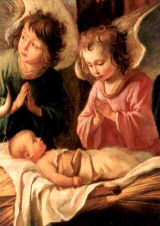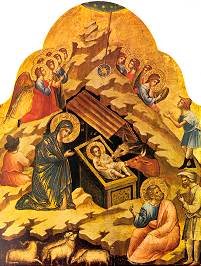Catholic Activity: Day Nine—Activities for the Feast of St. Basil and St. Gregory

The Feast of St. Basil is celebrated on New Year's Day in Greece and has special significance as Orthodox Christians throughout the world commemorate the memory of one of the greatest fathers of the Church, St. Basil. The personality of St. Basil gives life and sparkle to the feast, and adds a host of traditions and customs that have spanned centuries to the present.
DIRECTIONS
On New Year's Eve, as on Christmas Eve, grown ups as well as children go from house to house singing the New Year's Kalanda—similar to those of Christmas, but with different lyrics. They spread the good wishes of the season and proclaim that "St. Basil is coming from Cesaeria." As at Christmastime, the housewife gives the carolers a treat for coming and spreading the holiday cheer.
Many Greeks make Kollyva in memory of St. Basil and the departed family members. In Northern Greece, huge bonfires are again lit and villagers sing Kalanda and dance their traditional folk dances throughout the night.
The main attraction of the St. Basil's Feast, in typical Greek fashion, is the table. It is believed that the more abundant the table, the more abundant with good luck the family will be. Pork is again the staple dish of the traditional Greek New Year's table. Many dishes are are also prepared, depending upon the region.
But the staple at every Greek home is that of the St. Basil's Cake, or Vasilopita. The cutting of this special cake will reveal what the new year holds in store for the family, and the one who gets the silver coin that is hidden in the cake will be the lucky person of the year.
The round cakes are baked in different ways, but always have the year etched or embossed on top with dough or confectioner's sugar. A coin is slipped into the bottom of the cake after it is baked and placed at the center of the table. The master of the house cuts the cake with much solemnity, always making the sign of the cross over it with the knife that he/she holds in his hand.
Again, customs vary from region to region, but individual pieces are first cut for Christ, the Virgin Mary, St. Basil, the poor, and then the members of the household. The pieces that have been cut for Christ, the Virgin Mary, St. Basil and the poor are usually taken to the Church, where the priest will bless them and distribute them to the villagers who are elderly, poor or sick. Many people make entire Vasilopitas and donate them to needy families.
Unlike in the Western tradition, gifts are exchanged on "St. Basil's Day," or New Year's Day, commemorating the gifts that the real St. Basil brought to the poor children of the villages of Asia Minor where he lived.
There is a popular belief that saints come down to earth on their feast day. Thus, St. Basil is said to visit every house on New Year's Eve or Day—and he expects to be offered something! Much like the western tradition of leaving something for Santa, Greeks leave food on the table for St. Basil. In some regions, it is even customary to have a place setting for him, in case he decides to join the family for dinner.
A good way to observe this feast in the domestic church would be to use the Blessing of the Bread of St. Basil and have an evening of family festivity while enjoying the delicious Vasilopita and singing Christmas carols.
TABLE BLESSING

A Reading from St. Basil the Great
The bread you store up belongs to the hungry; the cloak that lies in your chest belongs to the naked; the gold that you have hidden in the ground belongs to the poor. If everyone would take only according to his needs and would leave the surplus to the needy, no one would be rich, no one poor, no one in misery.
RESPONSORY:
Verse:
Put no confidence in extortion,
and set no vain hopes on robbery
Response:
If riches increase,
do not set your heart on them (Ps 62:10).
The Lord's Prayer
Blessing
We bless you, Lord, our God, for you enlighten the church of the East and the West, with the solid doctrine of our teachers in the faith, St. Basil the Great and St. Gregory Nazianzus. May we always be ready to live according to these teachings, as we seek to follow the path of the gospel shown to us by Christ, your Son. Bestow your blessing upon our table and all those dear to us, and make us always mindful of the needs of others. We ask you this through Christ our Lord. Amen.
—From Table Blessings: Mealtime Prayers Throughout the Year by Victor-Antoine d'Avila-Latourrette, ©1994.






